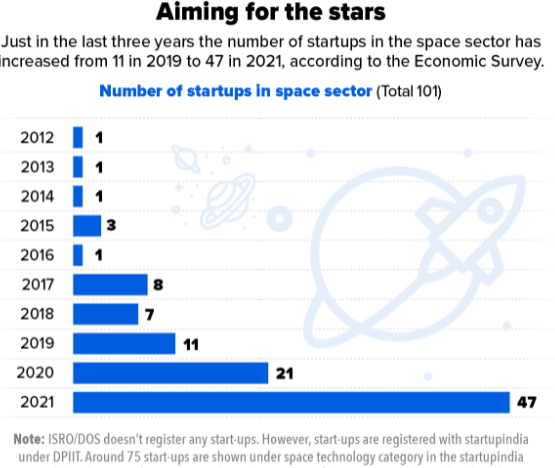Description

Disclaimer: Copyright infringement not intended.
Context
- There has been an increase in the number of recognised startups from 726 in 2016-17 to 65,861 in March 2022 - the Parliament was informed.
Definition of Start Up in India
An entity shall be considered as a startup if it satisfies all the following conditions:
- If it is incorporated/registered as any of the followings:
- Private Limited Company (as defined in Companies Act, 2013).
- Partnership Firm (registered under Partnership Act, 1932).
- Limited Liability Partnership (registered under Limited Liability Partnership Act, 2008).
- One Person Company (as defined in Companies Act, 2013).
Provided that such entity is not formed by splitting up or reconstruction of a business already in existence.
- It has not completed ten years since incorporation/registration as above.
- Its turnover for any of the financial years has not exceeded INR 100 Crore.
- It satisfies any of the following conditions:
- It is working towards: Innovation/ Development/Improvement of new products/processes/services .
- It is a scalable business model with a high potential of: Employment generation or Wealth creation.
A DPIIT recognized startup is eligible for exemption from the provisions of section 56(2)(viib) of the Income Tax Act.
Startups are exempted from income tax for 3 years provided they get a certification from Inter-Ministerial Board (IMB).
Status of Start Ups in India: Economic Survey 2022 Report
- India has over 61,400 startups recognised by the Department for Promotion of Industry and Internal Trade (DPIIT), with at least 14,000 recognised during fiscal 2022, according to the Economic Survey 2021-22.
- Startups in India have grown remarkably over the last six years. The number of new recognised startups has increased to over 14,000 in 2021-22 from only 733 in 2016-17.
- India has become the third-largest startup ecosystem in the world after the US and China.
- A record 44 Indian startups achieved unicorn status in 2021, taking the overall tally of startup unicorns in India to 83, with most in the services sector.
- In recent years, Delhi has replaced Bengaluru as the startup capital of India.
- Maharashtra has the highest number of recognised startups.

Government Schemes to Support Startups in India
- SAMRIDH( Startup Accelerators of MeitY for pRoduct Innovation, Development, and growth) Scheme to provide funding support to startups along with helping them bring skill sets together which will help them grow successful.
- Startup India Seed Fund - The Startup India Seed Fund Scheme (SISFS) aims to provide financial assistance to startups for proof of concept, prototype development, product trials, market entry and commercialization.
- Startup India Initiative gives tax benefits to startups under this scheme.
- A Scheme for Promotion of Innovation, Rural Industries and Entrepreneurship (ASPIRE) initiative to offer proper knowledge to the entrepreneurs to start with their business and emerge as employers.
- Pradhan Mantri Mudra Yojana (PMMY) provide startup loans of up to INR 10 lakhs to small enterprises, business, which are non-corporate, and non-farm small/micro-enterprises.
- eBiz - the first electronic government-to-business(G2B) portal, to transform and develop a conducive business environment in the country.
- “Support for International Patent Protection in E&IT (SIP-EIT)”. This scheme provides financial support to MSMEs and Technology Startups for international patent filing.
- Multiplier Grants Scheme (MGS): This scheme aims to encourage collaborative Research & Development (R&D) between industry and academics/institutions for the development of products and packages. Under the scheme, if the industry supports the R&D of products that can be commercialized at the institutional level, the government shall provide financial support which will be up to twice the amount provided by industry.
- Venture Capital Assistance (VCA) scheme by Small Farmer’s Agri-Business Consortium (SFAC) for the welfare of farmer-entrepreneurs. It intends to provide assistance in the form of term loans to farmers so that the latter can meet the capital requirements for their project's implementation.
- NewGen IEDC initiative launched by the National Science and Technology Entrepreneurship Development Board under the Department of Science and Technology. The initiative aims to inculcate the spirit of innovation and entrepreneurship among the Indian youth through guidance, mentorship, and support.
https://www.business-standard.com/article/current-affairs/number-of-recognised-startups-in-india-rises-to-65-861-says-govt-122032500790_1.html













